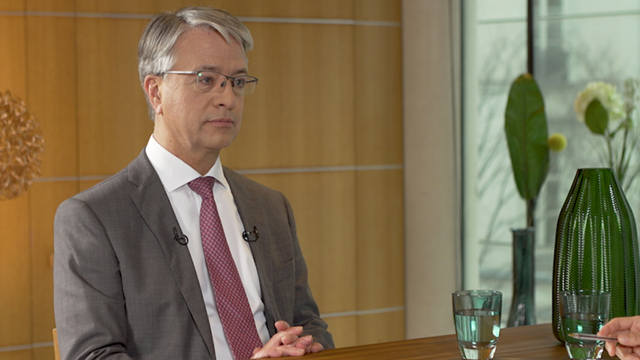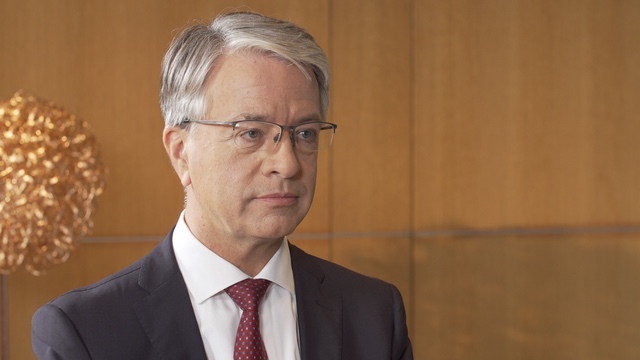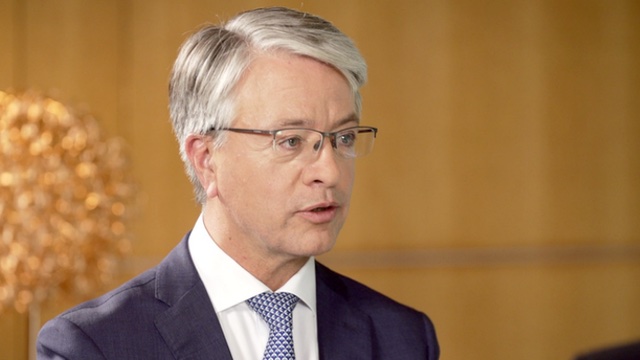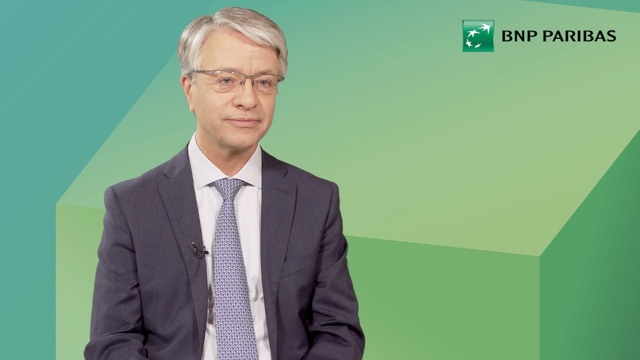EuroBusiness Media (EBM): BNP Paribas, one of Europe’s largest banks, reports results for the second quarter of 2013. Jean-Laurent Bonnafé, welcome! You are the CEO of BNP Paribas. What are your comments on the Group’s second quarter results?
Jean-Laurent Bonnafé: BNP Paribas reported a net income of 1.8 billion euros in the second quarter in spite of a still challenging European context.
Looking at the operating divisions, revenues were essentially stable thanks to BNP Paribas’ diversified business mix. This was due to the combination of resilience in Retail Banking, an increase in Investment Solutions and a slight reduction in CIB.
Operating costs were lower especially in Retail Banking, benefitting from the initial savings of our Simple & Efficient plan.
Cost of risk remained moderate despite the economic environment. BNP Paribas confirmed strong risk management across its businesses.
Overall, pre-tax income was 3% lower in our operating divisions. This quarter again, BNP Paribas delivered solid results in a difficult operating environment in Europe.
All Retail networks continued to show significant deposit growth which topped 6% in the Domestic Markets and in total Retail Banking.
BNP Paribas also confirmed very strong solvency and liquidity in Q2. In fact the Group’s fully loaded Common Equity Tier 1 ratio under Basel 3 reached 10.4%. Similarly the immediately available liquidity reserves were further increased to a massive 236 billion euros.
All this clearly confirms that BNP Paribas has a rock solid balance sheet.
EBM: What is your progress report on your "Simple & Efficient" cost savings plan? Is it possible that you may deliver more efficiency gains than initially planned by the end of 2015?
Jean-Laurent Bonnafé: Our Simple & Efficient plan has got off to a strong start. In fact, in the first semester we have already booked 330 million of cost savings. These benefitted from some quick wins and the anticipation of some projects which were launched at the end of 2012.
In parallel, we have incurred 229 million of transformation costs, of which 74 million in Q2 and investments for the second part of the year are currently under preparation.
Simple & Efficient is a far reaching and well-structured cost optimization plan centred on over 1,000 programmes which include a total of some 2,050 projects. To date 86% of the projects have already been launched, each with a designated manager, a specific budget and an implementation timetable.
The plan targets 2 billion euros of recurrent cost savings from 2015 and this remains our stated target. At this stage it’s too early to envisage any change in guidance.
EBM: The economic slowdown in Europe is weighing on banks’ asset quality. What has been the evolution of your cost of risk in Q2?
Jean-Laurent Bonnafé: As I mentioned, the Group’s cost of risk remained moderate in the second quarter. When compared to Q1, a good part of the increase was due to a one-off single ticket in our Capital Markets. For the year-on-year comparison, it must be remembered that in Q2 2012 we had significant write-backs in CIB.
Despite the economic slowdown in Europe, our strong risk management ensured that cost of risk in France and Belgium remained low while in Italy BNL stayed at the same level as last quarter.
Personal Finance also showed essentially stable cost of risk in the quarter while cost of risk in our international Retail banking was lower. This was due to a particularly low level at BancWest coupled with a lower level in our Europe-Med operations.
Finally, cost of risk in Corporate Banking returned at a more normal level in Q2 after a low level in the previous quarter.
EBM: Domestic Markets have proven quite resilient in a challenging context. Has this also been the case in the second quarter?
Jean-Laurent Bonnafé: Yes, our Domestic Markets proved very resilient generating a good overall performance. As I said earlier, deposits increased by over 6% with good growth in all the markets. On the other hand, the slowdown in credit demand continued.
In May we successfully launched our new fully mobile bank “Hello bank!” in Germany and in Belgium. This was followed in June by the launch in France. Italy will follow in the autumn.
In a context of persistently low interest rates we still managed to achieve 4 billion of revenues. This was helped by a pick-up in financial fees after several quarters at low levels and by the good contribution from Arval.
The ongoing adaptation of the cost base was confirmed in Q2 with operating costs marking a 1.4% reduction net of development costs for the launch of Hello bank!. This led to an improvement in the cost/income ratio in France, Italy and Belgium and the cost/income ratio of the Domestic Markets improved to 61.9%.
Overall, Domestic Markets generated a sizeable 1 billion euros of pre-tax income despite a higher cost of risk in Italy.
EBM: Could you also elaborate on the evolution of your other Retail operations in the quarter?
Jean-Laurent Bonnafé: The other Retail operations of the Group consist of Europe-Med, BancWest and Personal Finance.
Europe-Med produced another strong quarter driven by good volume growth especially in Turkey. Deposits were up 13.5% while loans progressed by 8.9%. In Q2 we continued to strengthen the cash management set up in the region. Cross-selling with CIB and Investment Solutions continued to develop well in Turkey.
This strong commercial trend translated into a revenue growth of 11.4%. In conjunction with good cost control, Europe-Med generated a pre-tax income in the quarter of 237 million euros. This represented a 54% increase, net of the capital gain we booked on the sale of our Egyptian subsidiary in Q2.
BancWest showed dynamic commercial activity in the quarter with deposits increasing by 4.4%. Loans progressed by 3.5% driven by a strong performance in corporate loans which benefitted from the investments made in strengthening the commercial set-up. Private banking also continued to develop well as managed assets reached 6 billion dollars at the end of June.
The persistence of low interest rates and lesser asset sales weighed on revenues while costs increased on the back of continuing investments in the corporate and private banking set-up. BancWest confirmed a strong contribution to Group results with 200 million of pre-tax income in Q2.
Finally, Personal Finance, our specialized consumer finance business. Among the notable events in the quarter, Personal Finance received the Vigeo certification for its Cetelem renewable credit offer in France. And it also lay the foundation for further development of consumer credit in China through the agreement signed with Bank of Nanjing.
Revenues were slightly lower due to the impact of the continuing run off of mortgage loans. Consumer credit in France continued to be burdened by regulatory impacts while it showed good trends in Belgium, Germany, Central Europe and Brazil.
Operating costs marked a significant reduction benefitting from the adaptation plan. This contributed to a significant lowering of the cost/income ratio which stood at 45% in Q2.
Personal Finance's good profit generation capacity was confirmed with a contribution to pre-tax Group profits in excess of 300 million.
EBM: Investment Solutions has been a source of growth for the Group in recent quarters: has this continued in Q2?
Yes indeed. Investment Solutions generated good results in Q2.
Before looking at the P&L, a word about assets under management. These stood at 869 billion euros, a slight reduction compared to end of last year. The semester saw outflows in monetary funds. However, there were good net inflows in Wealth Management and in Insurance. In both instances a significant contribution came from Asia and from domestic networks.
Revenues were 2% higher driven by Insurance notably in protection activity in Asia and Latin America. Securities Services revenues were also a bit stronger thanks to higher transaction volumes and despite persistently low interest rates. Wealth & Asset Management was slightly lower. This was due to lower average assets under management in Investment Partners partly compensated by a strong performance in Wealth Management.
Operating costs were down thanks to the benefit of the adaptation plan in Asset Management coupled with good cost control in Securities Services. Insurance showed higher costs reflecting increased levels of activity.
Overall, pre-tax income was 6.4% higher at 564 million in Q2 with a substantial contribution of all the businesses.
EBM: How do you rate your CIB performance in Q2?
Jean-Laurent Bonnafé: CIB revenues amounted to 2.1 billion euros this quarter, decreasing slightly as compared to the previous year on a comparable basis.
Thanks to an increase in client activity and despite a slowdown towards the end of the quarter due to renewed market tensions, revenues of Advisory and Capital Markets increased by 4.1%.
In Fixed Income, Rates activity was impacted by the very high volatility at the closing of the quarter and we saw a good performance in Credit and Forex. Levels of activity in bond issuance were good in Q2. At the end of June, we confirmed our number 8 ranking for “all international bonds” and top position for “all corporate bonds in euro”.
Equity & Advisory posted a rebound compared to the previous year. Stronger client flows and renewed interest for structured products was confirmed, especially in Europe and in Asia. Equity linked performed quite well and we kept a top positioning in Europe.
In Corporate Banking revenues decreased year-on-year as a result of the adaptation plan. The reduction was in line with that of outstanding loans. However, revenues were 9% higher compared to the previous quarter and we saw a rise in commissions. We booked some landmark deals in Originate-to-Distribute and confirmed our top position for syndicated loans in Europe.
Operating expenses were essentially stable as CIB benefitted from the first effects of Simple & Efficient while continuing to invest in business development for example in Asia and in North America.
EBM: The Fed Chairman has hinted at a future tapering of the Quantitative Easing policy. What would be the implications of rising interest rates for you?
Jean-Laurent Bonnafé: Generally speaking the tapering of the QE policy would be a signal that the US economy is recovering at a significant pace. And that would be a good sign for the global economy.
Higher interest rates are generally good for banks, especially when the starting point is the current historical low. However, BNP Paribas hedges most of its interest rate risk, meaning that higher rates would lead to a moderate benefit for the Group in terms of revenues.
EBM: What is your update on your Asia Pacific plan?
Jean-Laurent Bonnafé: In Asia our development is continuing according to plan and, as I have mentioned, we have seen a growing Asian contribution both in CIB and in Investment Solutions in the first part of the year.
As a reminder we have defined more than 30 development programmes with most of them already launched and covering either selected businesses or targeted geographies.
To give a few examples on the CIB side, we have launched two programmes to boost our commodity franchise and a total of six to strengthen the commercial set-up for corporates.
In Investment Solutions we are progressively increasing our assets under management in Wealth Management which top 36 billion euros. On the Insurance front we recently signed a joint-venture agreement with Bank of Beijing to develop life insurance in China. Gross premiums are growing fast and already stand at more than 1.2 billion euros.
Finally, as I’ve already told you, we signed also a joint-venture agreement with Bank of Nanjing to develop consumer finance in China.
So the Asia Pacific plan is well on track.
EBM: And how is the preparation of your new business plan proceeding?
Jean-Laurent Bonnafé: The preparation of the Group’s new business plan is also well on track. In fact we have presented two additional plans with our Q2 results: one business specific for Asset Management, and one regional for Germany.
Starting with Asset Management. This is a strategic business for the Group for three main reasons: (1) it’s a key business with regard to institutional clients, (2) it’s the business charged with managing our clients’ money, and (3) it’s a highly profitable business.
In Asset Management we have a global presence covering 40 countries and we manage 375 billion euros of assets. We are a significant player with institutional clients where we are ranked 7th in Europe. On several institutional strategies we are recognized by the top global consultants and magazines.
Another area where we have naturally strong positions is with retail and private banking clients via distribution in our 4 domestic markets. Beyond this we also enjoy access to large global distributors.
Lastly, we also have an appealing set-up in 17 emerging markets with 50 billion euros of distributed assets. This presence is complemented by local partnerships, as for example in Korea with Shinhan and in China with HFT.
Institutionals, Emerging markets and Distributors represent the 3 main axes of development for our Asset Management. For the institutionals, the focus will be on expanding the presence and recognition. In Asia and in Emerging countries, the plan aims at further developing and consolidating our presence. And with the Distributors, the ambition is to become one of the top 3 distribution platforms in continental Europe through a rationalization and optimization of the set-up.
We shall make selective investments to improve the set-up, especially on the institutional segment where we aim to attract and retain the best talents. We are targeting some 40 billion of net new cash during the plan with institutionals contributing the most part followed by Asia and the Emerging markets.
Revenues are expected to progress by 10% during the period, in line with the evolution of average assets under management. This will ensure a strong profitability going forward for this core business for BNP Paribas Group.
Moving now to Germany. It’s probably not fully perceived but we have a large and diversified set-up in this country covering all client segments. We have 12 operational entities and employ some 3,500 people. To give you an idea of our presence, in Retail we have some strong specialized franchises with Cortal Consors being a leader in online investment, Personal Finance being n°3 in point of sale consumer finance, and Leasing Solutions having strong positions in vendor programmes.
In CIB we have a long-standing footprint in the large corporate and institutional segments leveraging on 6 business centres, being an integral part of the Group’s “One bank for Corporates” approach.
And also in Investment Solutions we have some leading positions. For example Securities Services is the leading Depotbank, Cardif is a top player in credit protection insurance, and real Estate is number 1 for transactions in commercial real estate.
Our strategy in Germany consists of a global growth initiative fostering cross selling in all segments. We aim to boost deposit collection from individuals leveraging on Hello bank! and to increase lending especially to mid and large corporates to enhance our positioning with these clients. In conjunction with this, we are aiming to further reinforce strong positions in specialized businesses. A good example of this is in Securities Services where last week we signed the agreement to buy Commerzbank’s Depotbank activities.
The plan envisages strengthening the set-up through some 500 local hirings and improve the commercial effectiveness and visibility. For example we shall create some BNP Paribas Houses which shall group together the different German teams.
Over the plan horizon we are targeting a strong growth of commercial commitments in line with the development of the business activity and client base. We are targeting revenues to grow from 1.1 in 2012 to 1.5 billion euros in 2016. This equates to a compounded annual growth rate of 8% per annum over 4 years.
Overall, our aim is to develop a long term franchise in Germany which is an important market for our growth in Europe.
EBM: An agreement has finally been reached on the EU Bail-in framework which should enter into force on the 1st of January 2018. What are your views on the proposed approach?
Jean-Laurent Bonnafé: We welcome the fact that further steps have been taken in recent months towards more integration and unification in the supervision of the banking sector in Europe.
Referring to the bail-in framework, the aim is to arrive at a final vote by the Parliament before the end of the year.
I remind you that BNP Paribas has been one of the first European banks to set out its own Recovery & Resolution process which is updated on a yearly basis.
Coming back to the framework, although some depositor preference has been given to individuals and SMEs, the base of bail-inable debt envisaged by the proposal remains very broad. This is a good thing that BNP Paribas has always advocated. Given our very strong capitalization, this should be seen positively by our creditors.
Actually, we think that the bail-in framework will lead to increased differentiation between the large diversified global banks with very strong balance sheets – like ourselves – and the smaller less differentiated banks.
EBM: Regulators are increasingly looking at leverage ratios, albeit with differing definitions. Where do you stand with regard to your leverage ratio today?
Jean-Laurent Bonnafé: It’s true that there are a lot of different definitions of the leverage ratio which leads to some confusion. This is why we decided to disclose this quarter our Basel 3 leverage ratio ahead of the applicable schedule.
This ratio calculated on a fully loaded basis and conservatively computed with our sole common equity tier 1 stands at 3.4% which makes us already compliant. I remind you that the minimum threshold applicable from 1st January 2018 will be 3%.
However, we continue to believe that a risk-based approach is more appropriate than the leverage ratio which doesn’t encompass risk differences between bank’s balance sheets.
EBM: Jean-Laurent Bonnafé, CEO of BNP Paribas, thank you very much!
Jean-Laurent Bonnafé: You’re welcome!






